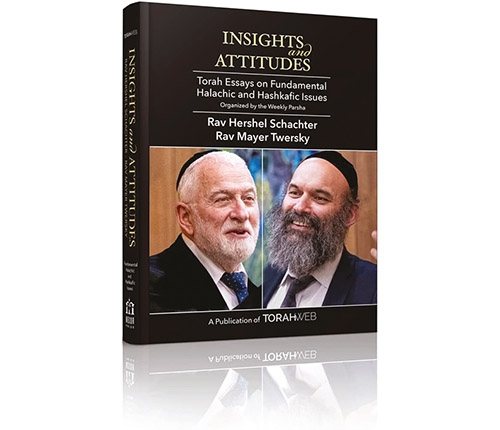
Editor’s note: This series is reprinted with permission from “Insights & Attitudes: Torah Essays on Fundamental Halachic and Hashkafic Issues,” a publication of TorahWeb.org. The book contains multiple articles, organized by parsha, by Rabbi Hershel Schachter and Rabbi Mayer Twersky.
About 50 years ago, the Yiddish press carried a news item that the Vaad Halacha of the Conservative movement issued a “psak halacha” that one may drink Welch’s grape juice. Their reasoning was that the Talmud (Avoda Zara 30a) states that there is no prohibition of stam yeinam on yayin mevushal and the grape juice was cooked.
Rav Soloveitchik came into his class the next day, related to the students what he had read and asked if anyone knew what was incorrect about the statement. The only one among the students who knew anything about the topic at the time was Rabbi Aharon Lichtenstein, who had a smile on his face. The Rav asked him to explain to the other students where the error was. So Rav Aharon explained:
The main reason Chazal prohibited stam yeinam was out of fear that it could possibly lead to intermarriage; the concern that perhaps the nochri may have been menassech the wine and would then later allow someone to drink it was very far-fetched. However, once Chazal instituted the prohibition out of concern for chasnus, they extended the issur to include even kosher wine handled by a nochri, lest the nochri was menassech it for avoda zara. In the event that the wine had previously been cooked, it would be even more unlikely that the nochri would be menassech it, and therefore, in that case, magga hanochri would not make the wine prohibited. But since in the case of Welch’s grape juice the wine was processed by nochrim before being cooked, the fact that they cooked it afterwards was irrelevant. The wine was forbidden because the concern of benoseihem (literally “their daughters,” meaning intermarriage), which is the primary reason for the issur of stam yeinam to begin with, still applied even though the far-fetched concern of nissuch no longer applied.
The fatty parts of the sacrifices that have to be burnt on the mizbeiach must be raw; if they are first cooked, the kohein does not fulfill his mitzva of haktara. This haktara lacks the element of reiach nichoach because the smell will simply not be the same. Similarly, the blood of a korban may not be cooked before being sprinkled upon the mizbeiach; if it is cooked first, it’s not considered dam (blood) but merely the “juice of the meat.” It is for this reason that we assume in Shulchan Aruch (Yoreh De’ah, siman 69) that eating dam shebishlo is only forbidden miderabbanan—such blood would not be acceptable in a korban, and that is the entire basis for the biblical prohibition forbidding dam.
The same is true regarding wine. Yayin mevushal is considered inferior and would not be accepted for nissuch on the mizbeiach. Since it would not be accepted on the mizbeiach in the Beis Hamikdash, we assume that the nochrim would probably also not use it for their avoda zara. For that reason, if a nochri handled kosher wine where there is no issue of “benoseihem,” but only the concern of nissuch, if the kosher wine had already been mevushal, the Chachamim never prohibited it.
Rabbi Hershel Schachter joined the faculty of Yeshiva University’s Rabbi Isaac Elchanan Theological Seminary in 1967, at the age of 26, the youngest Rosh Yeshiva at RIETS. Since 1971, Rabbi Schachter has been Rosh Kollel in RIETS’ Marcos and Adina Katz Kollel (Institute for Advanced Research in Rabbinics) and also holds the institution’s Nathan and Vivian Fink Distinguished Professorial Chair in Talmud. In addition to his teaching duties, Rabbi Schachter lectures, writes, and serves as a world renowned decisor of Jewish Law.








